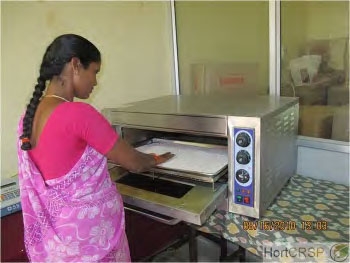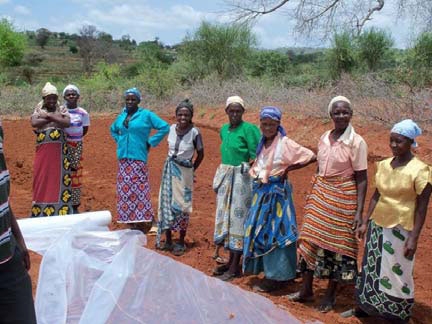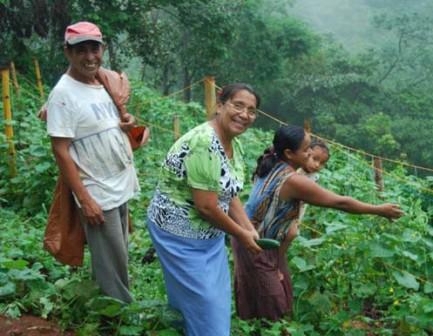
Posts Tagged: malnutrition
Addressing nutrition and poverty through horticulture

UC Davis is addressing food security and economic development in Africa, Southeast Asia, Central America, and elsewhere, by coordinating an international horticulture program. The Horticulture Collaborative Research Support Program (Hort CRSP; pronounced "hort crisp") is one of 10 CRSP programs that focus on global food production and solving food and nutrition problems in developing countries. UC Davis leads the Hort CRSP, with funding support from the U.S. Agency for International Development (USAID).
Examples of projects conducted by researchers and educators throughout the world include:
- Inexpensive cold storage systems in rural, developing areas to prolong food longevity; see page 2
- Concentrated solar drying of fruits and vegetables in East Africa; see page 3
- Improving safety and quality of tomatoes in Nigeria; see page 3
- Smallholder flower production in Honduras for export markets; see page 3
The overarching goals of the Hort CRSP are to reduce poverty and improve nutrition and health of the rural poor, while improving the profitability and sustainability of horticulture in the developing world. Priorities in the Hort CRSP include gender equity, sustainable crop production, postharvest technology, food safety, market access, and financing. The program awards research funding in the U.S. and abroad to:
- Realize opportunities for horticultural development
- Improve food security
- Improve nutrition and human health
- Provide opportunities for income diversification
- Advance economic and social conditions of the rural poor, particularly women

In the three years since the program’s inception, several projects have been completed, and many are ongoing. The program’s website offers a plethora of information, along with newsletters that highlight individual projects.
The program also has a YouTube channel, with videos on Hort CRSP projects. Some of the videos are about projects that are especially important in developing countries, including:
- The TRELLIS project — bringing together graduate students and in-country development organizations; YouTube link
- Using cell phones to give real-time information to growers in rural areas of India; YouTube link
- Inexpensive cultivation practices for smallholder farmers; YouTube link
- Indigenous products increase incomes in Ghana; YouTube link
- Saving indigenous crop seeds in Southeast Asia for resource-poor farmers; YouTube link

Milk’s secret for fighting childhood infections

Mills, an authority on the molecular biology of lactic acid bacteria used in foods, said, “We will examine the ability of these compounds from milk to prevent gastrointestinal infections and to establish healthy bacteria in the intestines.” He and his colleagues are working to move the basic research toward practical applications in human health.
Earlier research has shown that similar oligosaccharides in human breast milk play an important role in supporting growth of protective bacteria in babies’ digestive tracts. Such bacteria are known to minimize the risk and severity of diarrheal disease and other gastrointestinal infections in infants.
The UC Davis researchers are hopeful that milk from cows will provide an abundant source of oligosaccharides that have comparable therapeutic characteristics for young children who are no longer breast-feeding.
Mills noted that if the researchers’ hypothesis proves correct, they plan to explore how oligosaccharides can be incorporated in a healthful, cost-effective manner into various food products designed for nutritional therapy and for use in international famine and malnutrition relief efforts.
For more information, read the full press release.UC Davis' Nutributter to go beyond Africa

The Africa Nutributter studies found that children preferred a sweet paste, but the scientists believe regional flavors may make the supplement more appealing. For Guatemala, they plan a cinnamon-flavored Nutributter; for Bangledesh, the paste will be flavored with cumin and cardamom.
UC Davis nutrition professor Kathryn Dewey, who leads the project, said it remains to be seen whether Nutributter will be adapted for American consumers.
“I personally think it is marketable,” she said.
Each four-teaspoon serving of Nutributter paste, which comes in a ketchup-packet-like pouch, contains 40 essential vitamins and minerals. Unlike most other nutrient supplements, the product also provides 120 calories of energy plus protein and essential fatty acids. Nutributter is not meant as a replacement for local foods or breast milk, but rather to be added to youngsters’ and pregnant mothers’ traditional diets.
"More than 3 million children die each year of malnutrition due not just to a lack of calories, but also to poor diet quality, particularly insufficient intake of micronutrients like zinc and iron, which are so critical to healthy growth and development," Dewey said.
The idea for the nutrition supplement came from the successful use of Plumpy'nut, a peanut-based food developed by French researchers for famine relief. Each Plumpy-nut packet has 500 calories and children can gain 1 to 2 pounds a week by eating it twice daily. Plumpy-nut is meant to temporarily serve as the sole food source in emergency situations.
The UC Davis Nutributter team heads the International Lipid-based Nutrient Supplements Project (iLiNS). Last year, the project won a $16 million Bill and Melinda Gates Foundation grant. A 2008 UC Davis news release announcing the Gates Foundation grant gives more details about Nutributter and its use in African nations. More information is also available on the iLiNS Web site.
UC Davis team combats malnutrition
UC Davis nutrition researchers invented a four-teaspoon snack that can be used to supplement children's diets in poor countries to ensure proper body and brain development, according to a story in the Sacramento Bee.
Each ketchup-packet-sized serving of "Nutributter" contains 120 calories and 40 essential vitamins and minerals.
The idea for the nutrition supplement came from the successful use of Plumpy'nut, a peanut-based food developed by French researchers for famine relief. Each Plumpy-nut packet has 500 calories and children can gain 1 to 2 pounds a week by eating it twice daily. According to the Bee, Plumpy'nut saved some 30,000 lives in the Darfur region of Sudan in 2004.
Unlike Plumpy-nut, Nutributter is not meant as a sole food source. Parents mix the paste into food they feed their children.
"Many households simply don't have access to highly nutritious foods," the story quoted UC Davis nutrition professor Kathryn Dewey. "Because infants don't need a lot of calories, we've designed a supplement that is low in calories but has all the essential nutrients."
The UC Davis team leads the International Lipid-based Nutrient Supplements Project, a collaboration that is testing Nutributter in three African countries. Last year, the project won a $16 million Bill and Melinda Gates Foundation grant.
A 2008 UC Davis news release announcing the Gates Foundation grant gives more details about Nutributter and its use in African nations.

Kathryn Dewey (center with maroon shirt) with collaborators in Africa.
